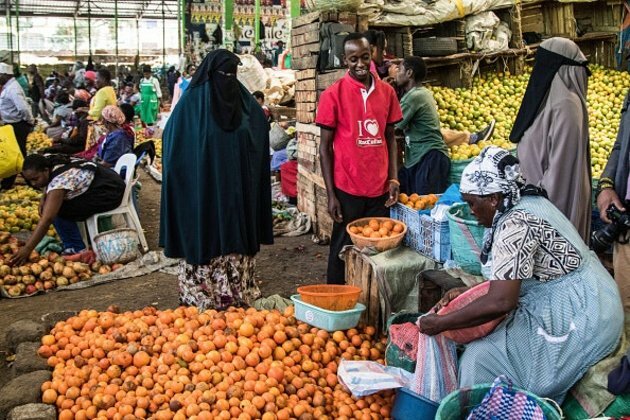Three reasons why the US Federal Reserve Bank holds the world in its hands
The Conversation
20 Sep 2022, 20:09 GMT+10

Inflation is a global problem. At the end of August, it was 8.3% in the US and 9.1% in the Euro area. It is 20.3% in Nigeria, 25% in Malawi, and over 30% in Ethiopia and Ghana.
The impact on Africa is devastating. The International Energy Agency estimates that by the end of the year 30 million more Africans will be unable to afford fuel for cooking. The World Bank estimates the number of Africans living in extreme poverty will increase from 424 million in 2019 to 463 million this year.
There is no agreement on why this is happening. Some argue that it is primarily a supply side problem. The dislocations in supply chains caused by the effects of the COVID pandemic and the war in Ukraine have reduced the available supply of goods like fuel, fertiliser and food, forcing their prices up.
Others maintain that it is primarily a consequence of the loose monetary policies of leading central banks like the US Federal Reserve (Fed). For a number of years they have kept interest rates low and engaged in quantitative easing. This involved buying bonds on financial markets to increase the funds available to financial institutions like commercial banks, investment banks, asset management firms, private equity firms, hedge funds, pension funds, insurance companies, money market funds, and sovereign wealth funds.
These two groups also differ on how to manage the problem. The first group argues that it will diminish as the supply side issues are resolved. They maintain that the current high prices will incentivise companies to increase production. The increased availability of goods like food, fuel and fertiliser, will ultimately lead to their prices - and inflation - falling.
The second camp argues that central banks should raise interest rates and unwind quantitative easing. They argue that these actions will make it more expensive for companies, households and governments to borrow. This in turn will slow the economy down and reduce demand (and potentially employment). This, they maintain, will drag prices lower and end inflation.
Unfortunately, the realities of global financial governance mean that the decision on which approach to adopt has been taken out of African hands.
The Federal Reserve has decided that the problem must be addressed as a monetary problem. Consequently, it is raising interest rates and unwinding quantitative easing.
African central banks must follow suit for at least three reasons.
Why African countries have no choice
First, the US dollar is the world's most important currency. In 2021 it accounted for 59% of global foreign reserves, over 70% of all trade invoices and over 60% of both deposits and loans denominated in non-local currencies. In 2019 it was involved in over 80% of foreign exchange transactions around the world.
The dollar's dominance means that the economic wellbeing of all countries is linked to their ability to obtain dollars and to its price in their local currency. It also gives the Fed, which is responsible for protecting its value, global leverage.
Second, the US$27 trillion market for US treasury securities is the largest and safest in the world. When there is trouble or uncertainty in the world, investors rush to buy dollars and invest in US markets. Their incentive to do so strengthens as the difference between US rates and those in other countries shrinks.
African central banks wishing to manage these movements have to raise their interest rates. Otherwise, they face the prospect of their currencies depreciating as investors sell assets denominated in local currencies to buy dollars. The falling value of their local currency will make it more expensive for their countries to buy the dollars they need to service their dollar denominated debts and pay for imports. This in turn risks causing higher domestic inflation.
Third, de facto, the Fed is the most important actor in the governance of the international financial system.
For example, at the onset of the COVID-19 pandemic panicked investors around the world scrambled to convert their investments into dollars thereby reducing access to credit for sovereigns, corporations, and households around the world. The Fed, to avoid a crisis in US markets, responded forcefully and rapidly. Within weeks, the Fed injected over US$2.3 trillion into financial markets and activated swap lines that provided access to $30-60 billion to select central banks.. It also created a special facility to help other central banks.
The Fed's actions provided liquidity to financial institutions. They, in turn, decided how to allocate the trillions of dollars of additional liquidity among their many sovereign, corporate and household clients.
By mid-2020 US dollar credit to emerging market and developing countries had grown by about 7% to US$4 trillion.
The IMF, ostensibly the leading global economic governance institution, moved more slowly. Between March 2020 and March 2022, it provided a total of US$171 billion in emergency financial support to 90 countries.
The Fed's role today
Now that the Fed has decided to fight inflation, it is, in effect, reversing the support it was giving to the global economy. Its policies are contributing to depreciating currencies, rising prices and greater risk of debt defaults in many African countries.
International organisation can do relatively little to help developing countries deal with the situation. At best these institutions can make tens of billions of dollars available to all their developing country member states. By comparison, the US Fed's quantitative tightening policy will withdraw US$95 billion per month from markets.
The growing role of the Fed in global financial governance poses two challenges. The first is that the Fed is a creature of US law and is required to fulfil its statutory mandate of price stability and full employment in the US. To the extent that it takes the impact of its actions on other countries into account, it focuses on those countries that it believes have a significant impact on the US domestic monetary and financial situation.
This exacerbates the international financial system's bias in favour of the richest countries. It may also adversely affect the sustainability of the global economy and the planet.
The second challenge is that African countries have no means for holding the Fed accountable for the adverse impacts its actions have on Africa.
What can African states do?
Clearly, their options are limited as long as the dollar retains its dominant position in the global financial system and global financial markets remain so powerful.
First, they can promote greater awareness of the impact this situation has on Africa.
African central banks, operating through an organisation like the Association of African Central Banks, can educate the Fed about the impacts of its policies and actions on Africa.
Second, they can advocate for an international body such as the Bank for International Settlements, to set up an independent office to study the global financial governance role of central banks, to consult with affected parties and to issue regular public reports. This office should develop a set of international standards to guide the Fed and other leading central banks on how to balance their domestic mandates and their extra-territorial responsibilities as global financial governance actors.
Author: Danny Bradlow - SARCHI Professor of International Development Law and African Economic Relations, University of Pretoria 
 Share
Share
 Tweet
Tweet
 Share
Share
 Flip
Flip
 Email
Email
Watch latest videos
Subscribe and Follow
Get a daily dose of Tennis Times news through our daily email, its complimentary and keeps you fully up to date with world and business news as well.
News RELEASES
Publish news of your business, community or sports group, personnel appointments, major event and more by submitting a news release to Tennis Times.
More InformationSports
SectionNHL roundup: Adam Fantilli's hat trick carries Jackets past Rangers
(Photo credit: Brad Penner-Imagn Images) Adam Fantilli registered his second career hat trick and Mathieu Olivier and Dante Fabbro...
Vantanu PM orders cancellation of citizenship request for Lalit Modi
Port Vila [Vanuatu], March 10 (ANI): Vanuatu Prime Minister Jotham Napat directed the country's Citizenship Commission to cancel the...
"Happy we were able to play as a unit": Virat Kohli after winning ChampionS Trophy 2025 title
Dubai [UAE], March 10 (ANI): After winning the ICC Champions Trophy 2025 against New Zealand on Sunday, India's stalwart batter Virat...
Kawhi Leonard's buzzer-beater lifts Clippers past Kings in OT
(Photo credit: Kirby Lee-Imagn Images) James Harden scored 29 points, and Kawhi Leonard added 17 with the game-winning basket at...
Cade Cunningham scores 28 to propel Pistons past Trail Blazers
(Photo credit: Jaime Valdez-Imagn Images) Cade Cunningham scored 28 points and Tobias Harris added 20 points and nine rebounds to...
Mikael Granlund, Stars take down Canucks
(Photo credit: Bob Frid-Imagn Images) Mikael Granlund broke a deadlock late in the second period and sparked the visiting Dallas...
Lifestyle
SectionElon Musk fathers 14th child, third with current partner
WASHINGTON, D.C.: Multi-billionaire Elon Musk, a close adviser to U.S. President Donald Trump, has welcomed his 14th child. His newest...
Prada keeps acquisition options open, CEO Andrea Guerra says
MILAN, Italy: Prada CEO Andrea Guerra suggested this week that the Italian luxury brand is keeping its options open regarding potential...
Homeless numbers reach all-time high in Ireland
DUBLIN, Ireland: Homelessness in Ireland has reached an all-time high, with 15,286 people in emergency accommodation in January 2025,...
Japan’s birth rate hits record low amid aging population
TOKYO, Japan: The number of babies born in Japan fell to a record low of 720,988 in 2024 for a ninth consecutive year, the health ministry...
Panama releases dozens of detained deportees from US into limbo
Panama City — After weeks of lawsuits and human rights criticism, Panama on Saturday released dozens of migrants who were held for...
From recreation of 'Gangnam Style' to zest of 'Bhangra', here's how India players celebrated CT success
Dubai [UAE], March 10 (ANI): India's rising sensation and established stalwarts went into a frenzy after scripting history with a victory...













